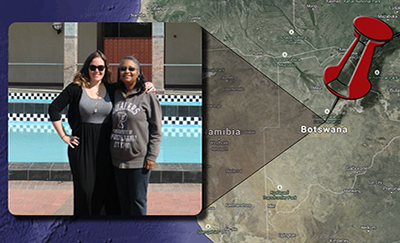News Details
School of Social Policy & Practice Explores Opportunities in Botswana

Authored by: Jill DiSanto
Student Life
07/23/15
The School of Social Policy & Practice at the University of Pennsylvania may become another element in the Botswana-UPenn Partnership.
Jerri Bourjolly, the School of Social Policy & Practice’s associate dean for academic affairs and director of its Master of Social Work program, and Erica Zaveloff, a grant writer and coordinator of SP2 Community Teamworks, the School’s community-service arm, traveled to Botswana in July to identify potential areas of collaboration.
Founded in 2001, the Botswana-UPenn Partnership is a coordinated effort between Penn, the University of Botswana and the Government of Botswana, that encompasses clinical care, education and research. The School of Social Policy & Practice is now hoping to be a part of that effort in addressing HIV/AIDS, tuberculosis, women’s health, as well as social welfare issues.
“SP2 has been working to increase its global footprint and develop its international outreach. This trip was part of a larger effort to expand global learning opportunities, not only for students and faculty, but also so that we learn from our counterparts elsewhere,” says John L. Jackson Jr., the dean of the School of Social Policy & Practice. “We are continuing to strengthen our international programs, as well as our impact, as we think strategically about initiatives across the world.”
The initial learning expedition was designed to determine if and how the School can support and enhance the work in which the people in Botswana are already involved.
“This venture is in line with the Penn Compact, to engage globally and to prepare students to work with culturally diverse populations,” Bourjolly says, “and from an interdisciplinary perspective.”
Bourjolly and Zaveloff say that the School of Social Policy & Practice could be a part of several aspects of the partnership, including collaborating with faculty from the University of Botswana on pertinent social work and social policy research projects, as well as entertaining the possibility of international teaching exchanges.
“This partnership will provide education and research opportunities for our students as well,” Zaveloff says. “SP2 students have already worked in Botswana and produced research papers as a part of a summer internship program. Based on their positive experiences, we want to expand this opportunity to more students.”
During their trip, Bourjolly and Zaveloff visited existing and potential internship and field placement sites; met with faculty at the University of Botswana; and met with ministry, hospital and higher education representatives to understand the context and challenges of social work practice in Botswana, as well as the nation’s most pressing social policy issues.
After finishing their work in Gaborone, Zaveloff extended her stay in Botswana through mid-August returning to Mokubilo, a small rural village to the North, where she spent more than two years as a Peace Corps volunteer.
Four years ago as a community capacity builder in Mokubilo, she worked with a support group for adults who were HIV positive. At the time, the village was one of the few sites in the country without electricity, and about 40 percent of the residents tested positive for HIV. Despite numerous education campaigns, people were still misinformed about how HIV spreads and how to prevent it.
Zaveloff and her team developed a research-based, peer-education program. She says the biggest impact she noticed was on the women in the support group.
“For some, this was their first paying job. I saw increased confidence and pride and a belief in their own intelligence and ability,” Zaveloff says. “To me, that is invaluable.”
Zaveloff says Botswana has developed a great deal since then and she thinks the infrastructure for electricity might be the most significant difference.
“Our goal was to gain a stronger understanding of how SP2’s faculty and students can both support and learn from the work and experience of social workers and social policy experts on the ground,” Zaveloff says. “What are their most pressing social policy needs and social work education challenges? What are their research needs? How can students effectively learn and contribute quality work? These are some of the questions that have framed our trip.”
The School can likely launch its internships and research projects by the summer of 2016, say Bourjolly and Zalevoff. They are also thinking about the possibility for summer field placements as a longer-term goal.